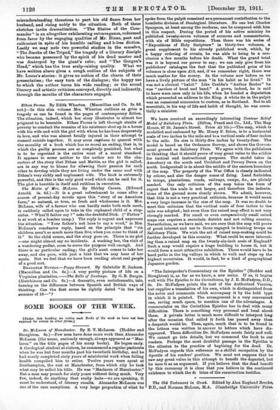SON1 - 1 4 1 BOOKS OF THE WEEK.
[Tinder this heading we notice such Books of the week as have not been reserved for review in other forms.] Dr. McLaren of Manchester. By E. T. McLaren. (Hodder and Stoughton. 6s.)—Few men have done more work than Alexander McLaren (the name, curiously enough, always appeared as " Mac- laren" on the title pages of his many books). He began early. A theological student at sixteen, he commenced a regular pastorate when ho was but four months past his twentieth birthday, and he had nearly completed sixty years of ministerial work when failing health compelled him to retire. Twelve years were spent at Southampton, the rest at Manchester, from which city he took what may be called his title. He was "Maclaren of Manchester." But a man may preach for sixty years without doing much. Very few, indeed, do anything that really lasts—we are speaking, it must bo understood, of literary results. Alexander McLaren was one of the rare exceptions. A very large proportion of what he spoke from the pulpit remained as a permanent contribution to the homiletic division of theological literature. No one but Charles Spurgeon, at least among the moderns, can be compared with him in this respect. During the period of his active ministry he published twenty-seven volumes of sermons and commentaries, with six of Bible expositions. Then there was his series of "Expositions of Holy Scripture" in thirty-two volumes, a great supplement to his already published work, which, by a happy ordering of events, he was able to bring to a con- clusion a few months before his death. What the grand total was it is beyond our power to say; we can only give from his publishers' catalogue the fact that the published price of his volumes is close upon £15, and, if we remember right, there was much matter for the money. In the volume now before us we have a lively picture of the man " in his habit as he lived." It was not a clerical "habit." Like Crabbe's " Author Rector" he was "careless of hood and band." A gown, indeed, he is said to have worn once only in his life, when he headed a deputation which presented an address to the King. A white tie in the pulpit was an occasional concession to custom, as in Scotland. But in all essentials, in his way of life and habit of thought, he was essen- tially a minister.


































 Previous page
Previous page